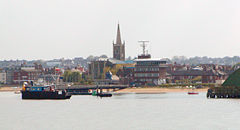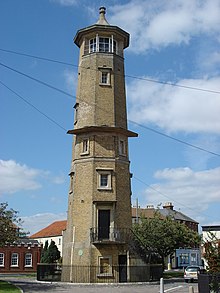Harwich
| Harwich | |
|---|---|
 Harwich in late-May 2004 |
|
| Harwich shown within Essex | |
| Population | 17,684 (2011) |
| OS grid reference | TM243313 |
| District | |
| Shire county | |
| Region | |
| Country | England |
| Sovereign state | United Kingdom |
| Post town | HARWICH |
| Postcode district | CO12 5 |
| Dialling code | 01255 |
| Police | Essex |
| Fire | Essex |
| Ambulance | East of England |
| EU Parliament | East of England |
| UK Parliament | |

The Harwich High Lighthouse of 1818
|
|
| Location | Harwich Essex England |
|---|---|
| Coordinates | 51°56′40″N 1°17′19″E / 51.944468°N 1.288553°E |
| Year first constructed | 1665 (first) |
| Year first lit | 1818 (current) |
| Deactivated | 1863 |
| Construction | brick tower |
| Tower shape | tapered enneagonal prism with light shown from the top window and tented roof |
| Markings / pattern | unpainted tower |
| Height | 21 metres (69 ft) |
| ARLHS number | ENG-093 |
| Managing agent | The Harwich Society |
Harwich /ˈhærɪtʃ/ is a town in Essex, England and one of the Haven ports, located on the coast with the North Sea to the east. It is in the Tendring district. Nearby places include Felixstowe to the northeast, Ipswich to the northwest, Colchester to the southwest and Clacton-on-Sea to the south. It is the northernmost coastal town within Essex.
Its position on the estuaries of the Stour and Orwell rivers and its usefulness to mariners as the only safe anchorage between the Thames and the Humber led to a long period of maritime significance, both civil and military. The town became a naval base in 1657 and was heavily fortified, with Harwich Redoubt, Beacon Hill Battery, and Bath Side Battery.
Harwich today is contiguous with Dovercourt and the two, along with Parkeston, are often referred to collectively as Harwich.
The town's name means "military settlement," from Old English here-wic.
The town received its charter in 1238, although there is evidence of earlier settlement – for example, a record of a chapel in 1177, and some indications of a possible Roman presence.
Because of its strategic position, Harwich was the target for the invasion of Britain by William of Orange on 11 November 1688. However, unfavourable winds forced his fleet to sail into the English Channel instead and eventually land at Torbay. Due to the involvement of the Schomberg family in the invasion, Charles Louis Schomberg was made Marquess of Harwich.
...
Wikipedia

